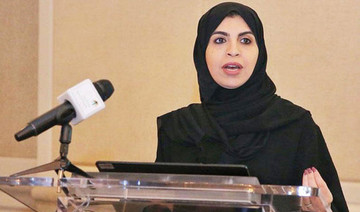JEDDAH: The president of the Saudi Human Rights Commission, Dr. Bandar bin Mohammed Al-Aiban, said on Wednesday that the Kingdom is committed to promoting the rights of people with disabilities.
Al-Aiban was speaking at the opening of the “Rights of People with Disabilities” symposium in Riyadh, organized by the commission in cooperation with the local office of the UN. The symposium focused on currently available services — and plans for their development — in Saudi Arabia for disabled people, and discussed the challenges facing this segment of Saudi society.
UN Resident Coordinator in Saudi Arabia Nathalie Fustier said the UN appreciates the Kingdom's efforts, citing the Kingdom's ratification of the Convention on the Rights of Persons with Disabilities and the Optional Protocol in 2008 as an example of Saudi’s support for the cause.
Mayssam Tamim, the assistant resident representative of the UN Development Program, described the Kingdom’s progress in ensuring the rights of people with special needs as “remarkable,” highlighting the increase in the number of associations and centers dedicated to their rehabilitation; the improvement in health care services; the drive to monitor the health of children likely to develop disabilities; and the creation of support offices in health facilities to provide logistical assistance.
Tamim also discussed the progress in education — pointing out that students with disabilities are being integrated into public schools, where they are provided with social service support and with special equipment including books printed in Braille, audio books, sign language courses, and support services — and in labor and social welfare, highlighting the establishment of the “Tawafuq” employment program in 2014. Tawafuq, which is the Arabic word for success, ensures equal employment opportunities within the private sector for Saudis with disabilities, she explained.
The symposium featured several papers submitted by Saudi ministries. Dr. Walid bin Khalifa Al-Shumaimeri submitted a paper on behalf of the Ministry of Health, reviewing the services offered to disabled people around the Kingdom.
Al-Shumaimeri presented a number of challenges faced by the ministry, pointing out that some health facilities cannot be adapted to better serve disabled people due to a lack of space or inadequate infrastructure.
“The statistical survey for people with disabilities may not be accurate enough, thus adversely affecting the geographical distribution of services,” he said.
Al-Shumaimeri also bemoaned the lack of a unified training program on the rights of disabled people, and how best to handle them, for healthcare workers. At the moment, he explained, “each entity implements its own training programs.”












